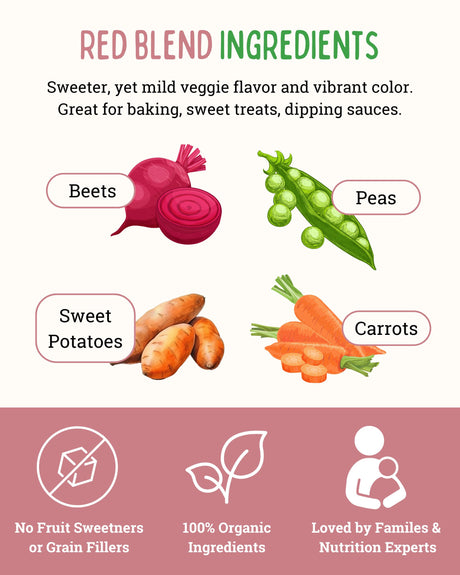Why Kids' Heart Health Matters
In today's fast-paced world, ensuring our children's health is more crucial than ever. One aspect we often overlook is heart health. Yes, you read that right—heart health in kids is vital too!
As parents, guardians, or caregivers, we play a significant role in shaping their lifelong habits. And when it comes to their hearts, a little guidance can go a long way.
A Roadmap to Heart-Healthy Eating for Kids
Welcome to our exploration of heart-healthy foods for children. Our primary goal is to provide parents, caregivers, and anyone concerned with kids' health a practical roadmap. We aim to simplify the complex world of children's nutrition, making it easier for everyone to nurture young hearts and foster lifelong wellness habits.
So, let's dive into this journey together, armed with knowledge and a commitment to giving children the best possible start in life.
The Foundation: Fruits and Vegetables

Colorful Bounty for Growing Hearts
Fruits and vegetables are the vibrant cornerstone of a heart-healthy diet for kids. They're packed with essential nutrients, fiber, and antioxidants that nurture young hearts and support overall health.
The colors they bring to the plate signal a diverse range of nutrients and health benefits.
Why Variety Matters
Encouraging your child to enjoy a variety of colorful fruits and vegetables is crucial. Each hue represents a unique set of nutrients and heart-boosting properties. For instance, deep greens like spinach and kale are rich in folate, which is vital for heart health.
Bright oranges and yellows, found in carrots and sweet potatoes, offer a bounty of beta-carotene, an antioxidant that supports young hearts.
Heart-Healthy Picks
When it comes to heart-healthy choices in this category, think of the following options:
- Berries Bursting with Goodness: Berries like strawberries, blueberries, and raspberries are not only delicious but also packed with antioxidants that protect your child's heart.
- Citrus Zest: Citrus fruits like oranges, grapefruits, and tangerines are rich in vitamin C, which supports healthy blood vessels and overall heart function.
- Leafy Greens for Life: Leafy greens such as spinach, kale, and Swiss chard are a nutrient powerhouse, providing essential vitamins and minerals that contribute to a robust heart.
By incorporating these vibrant fruits and vegetables into your child's diet, you're laying a strong foundation for a healthy heart and a lifetime of nutritious eating habits.
Whole Grains for Heart Health
Whole Grains: The Heart's Best Friend
When it comes to nurturing your child's heart, whole grains are your trusty allies. Unlike refined grains, whole grains retain their nutrient-rich bran and germ, offering a slew of benefits that promote heart health. By making whole grains a part of your child's diet, you're giving them a gift that keeps on giving.
The Whole vs. Refined Grains Face-Off
Whole grains have a clear advantage over their refined counterparts. They're packed with essential nutrients like fiber, vitamins, and minerals, which work together to support heart health. Unlike refined grains, whole grains offer sustained energy, keep blood sugar levels stable, and help manage weight—a trio of factors that positively impact the heart.
Heart-Healthy Whole Grain Picks

Here are some heart-smart whole grain options that your child will love:
- Oats: Rolled oats or steel-cut oats make for a wholesome breakfast choice. They're loaded with fiber and can help lower cholesterol levels.
- Whole Wheat: Opt for whole wheat bread, pasta, and crackers instead of their refined counterparts. Whole wheat is rich in fiber and nutrients that support heart health.
- Brown Rice: Swap white rice for brown rice to provide your child with more vitamins, minerals, and fiber. It's a heart-healthy alternative.
- Quinoa: This versatile grain is a nutritional powerhouse. It's high in protein, fiber, and heart-boosting antioxidants.
- Barley: Barley is a lesser-known whole grain that's excellent for the heart. It's packed with soluble fiber that helps lower cholesterol levels.
Healthy Fats for Growing Hearts
Fats: The Unsung Heroes of Heart Health
When it comes to nourishing your child's heart, don't be afraid of fats—just make sure they're the right kind. Healthy fats play a pivotal role in supporting heart health in children. They're essential for growth, provide a concentrated source of energy, and deliver a range of nutrients crucial for overall well-being.

The Crucial Role of Healthy Fats
Healthy fats, particularly unsaturated fats, are like a secret weapon for your child's heart. They help maintain healthy cholesterol levels, reduce inflammation, and support proper brain development—all vital aspects of growing up strong and healthy.
By incorporating these fats into your child's diet, you're setting the stage for a heart-healthy future.
Dairy and Alternatives: Heart Health Essentials
Balancing Dairy in a Heart-Healthy Diet
Dairy products and their alternatives can be valuable contributors to your child's heart health. These foods are packed with essential nutrients like calcium and protein, which are crucial for growing bodies and strong hearts.
However, it's essential to strike a balance and choose wisely when it comes to dairy.
The Role of Dairy in Heart Health
Dairy products offer a valuable source of calcium, which is essential for building strong bones and teeth. Calcium also plays a role in blood clotting and muscle function, including the heart's muscle.
However, some dairy options can be high in saturated fats, so it's important to opt for low-fat or fat-free versions to support heart health.
Heart-Healthy Dairy and Alternatives

Here are some heart-healthy dairy and non-dairy sources of calcium and protein:
- Low-Fat or Fat-Free Milk: These options provide the same calcium and protein benefits as whole milk but with less saturated fat.
- Greek Yogurt: Greek yogurt is packed with protein and probiotics, which support digestive health. Choose low-fat or fat-free varieties.
- Cheese: Opt for reduced-fat cheese options to enjoy the flavor and calcium without excess saturated fat.
- Fortified Plant-Based Milk: Almond, soy, or oat milk fortified with calcium and vitamin D can be excellent dairy alternatives.
- Tofu: Silken or firm tofu can be blended into smoothies, added to stir-fries, or used in various dishes as a dairy-free source of protein and calcium.
- Dark Leafy Greens: Vegetables like kale, collard greens, and broccoli are calcium-rich choices that can be incorporated into salads, stir-fries, or omelets.
- Canned Fish: Sardines and salmon with bones offer calcium and heart-healthy omega-3 fatty acids. These can be used in sandwiches or salads.
By including these dairy and non-dairy options in your child's diet, you're not only promoting their heart health but also ensuring they receive the essential nutrients needed for growth and overall well-being. Let's make dairy and alternatives a delicious and heart-healthy part of our children's journey!
Hydration Matters: A Heart-Healthy Connection
Quenching Hearts with Proper Hydration
While it might not be immediately obvious, staying well-hydrated is closely linked to heart health, even for our little ones. Hydration plays a vital role in maintaining healthy blood circulation, which in turn supports a strong heart. Let's dive into the connection and explore some smart beverage choices for your children.
The Heart-Hydration Connection
Proper hydration is essential for maintaining the right balance of fluids in the body. When your child is well-hydrated, their blood volume remains adequate, allowing the heart to efficiently pump blood throughout their body. Dehydration, on the other hand, can strain the heart, making it work harder to circulate blood..
Limit Sugary and Caffeinated Drinks
Avoid sugary beverages like soda, energy drinks, and excessive fruit juices, as they can contribute to excess sugar intake and may negatively impact heart health. Additionally, it's best to limit caffeine intake in children, as too much caffeine can affect hydration.
Creating Balanced Meals for Heart Health
Nurturing Growing Hearts with Balanced Nutrition
Now that we've explored the essential components of a heart-healthy diet for children, let's put it all together into balanced meals that your little ones will love.
By combining the recommended foods in thoughtful ways, you can ensure they get the nutrition they need while developing a taste for heart-smart eating.
The Building Blocks of Heart-Healthy Meals
To build heart-healthy meals for children, focus on incorporating a variety of foods from different groups. Include colorful fruits and veggies for vitamins, minerals, and antioxidants. Opt for whole grains like brown rice, whole wheat bread, or quinoa to provide fiber and sustained energy. Incorporate lean protein sources such as poultry, fish, beans, and tofu to support muscle growth and repair.
Don't forget to add sources of healthy fats like avocado, nuts, and olive oil for heart health. Ensure your child gets enough calcium and vitamin D from dairy products or fortified alternatives.
Sample Heart-Healthy Meal Ideas
Here are some sample heart-healthy meal ideas for children: Start the day with whole grain oatmeal topped with fresh berries and Greek yogurt, along with a glass of milk or fortified plant-based milk.
For lunch, consider a turkey and avocado whole grain wrap paired with carrot sticks and hummus. Dinner can include baked salmon with a quinoa and vegetable medley, along with a side of steamed broccoli.
As for snacks, offer sliced apple with almond butter or a yogurt parfait featuring granola and mixed berries. Don't forget to keep your child well-hydrated throughout the day with water.
Balance and Variety Are Key
The key to creating balanced meals is variety. Rotate through different foods and recipes to expose your child to diverse flavors and nutrients. It's also essential to listen to their hunger and fullness cues, allowing them to eat until satisfied.
By offering balanced and heart-healthy meals, you're not only supporting their physical growth but also teaching them the importance of lifelong nutritious eating habits. Nurturing their hearts and bodies has never tasted so good!
Incorporating Heart-Healthy Habits in Kids
Making Heart Health Fun and Delicious
Encouraging your children to embrace heart-healthy foods can be an enjoyable and rewarding journey. By introducing positive habits and setting a loving example, you can help your little ones develop a lifelong appreciation for nutritious eating.
Practical Tips for Kids and Heart-Healthy Foods
Get Creative with Presentation: Make meals visually appealing by arranging fruits and veggies in fun shapes or using colorful plates. Kids are more likely to try foods that look exciting.
- Cook Together: Involve your children in meal preparation. Let them assist with age-appropriate tasks like washing vegetables, stirring, or setting the table. This fosters a sense of ownership and curiosity about food.
- Storytelling with Food: Create stories or themes around meals. For example, have a "rainbow dinner" with foods of different colors. Discuss the superpowers each color represents for health.
- Try New Recipes: Explore new recipes together as a family. Allow your children to choose a heart-healthy dish they'd like to prepare and taste. This adventure in the kitchen can be both educational and delicious.
- Picky Eaters: If you have a picky eater, be patient. Offer a variety of heart-healthy options, and don't pressure them to eat. Sometimes it takes multiple exposures to a new food before a child decides to try it..
Nurturing Heart-Healthy Kids
Key Takeaways
Build heart-healthy meals for your children by focusing on colorful fruits and vegetables loaded with vital vitamins and antioxidants. Opt for whole grains like brown rice and oats for sustained energy and nutrients. Prioritize lean protein sources such as poultry and legumes to support growth without excess saturated fat.
Include unsaturated fats from avocados and nuts for heart health. Ensure calcium intake through dairy or alternatives, and choose nutritious snacks like fresh fruit and yogurt. Stay hydrated with water or low-sugar beverages, and create balanced meals by combining these elements.
Involve your kids in meal preparation, get creative with food, and lead by example with family meals and outdoor activities for overall well-being.
Start Gradually for Lasting Impact
To all the parents on this journey, remember that change doesn't happen overnight. Start gradually, incorporating these dietary changes into your family's routine. Small steps lead to big transformations. Your commitment to their heart health today will shape their tomorrows in the most beautiful way possible.
Let's embark on this adventure together, nurturing heart-healthy kids who will carry the gift of well-being throughout their lives.
Leave your comments below; we love to hear from you! And don't forget to follow EasyPeasie for more veggie info and convo on YouTube, Facebook, and Instagram! ~ThePeas













